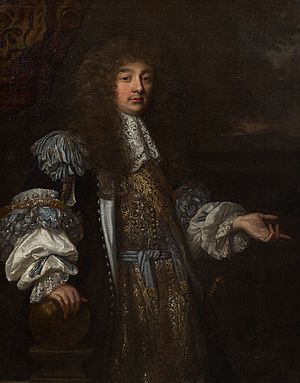Wentworth Dillon, 4th Earl of Roscommon facts for kids
Wentworth Dillon, 4th Earl of Roscommon (1637–1685), was an Anglo-Irish soldier and poet. He was known for his writings and his efforts to improve the quality of English poetry. He held the title of Earl of Roscommon, which was a noble rank in Ireland.
Contents
Who Was Wentworth Dillon?
Wentworth Dillon was born in October 1637 in Dublin, Ireland. His father was James Dillon, 3rd Earl of Roscommon, who was the third Earl of Roscommon. His mother, Elizabeth Wentworth, was English. She was the sister of Thomas Wentworth, Earl of Strafford, a very important official at the time.
Growing Up
As a young child, Wentworth was taught by a private tutor. This happened at Wentworth Woodhouse, his uncle Thomas's family home in England. Later, he went to Caen in Normandy, France. There, he studied at a special school or university.
In 1649, when Wentworth was about 12 years old, his father died. This meant Wentworth became the 4th Earl of Roscommon. He was still in France when this happened. After his father's death, he traveled to Italy and studied in Rome. He returned to London when King Charles II came back to the throne in 1660. He was welcomed at the royal court.
His Marriages
Wentworth Dillon married two times. He did not have any children from either marriage.
In April 1662, he married Frances Boyle. She was the daughter of a powerful nobleman, Richard Boyle, 1st Earl of Burlington.
On November 10, 1674, he married Isabella Boynton. She lived longer than he did, passing away in 1721.
What He Did
When Wentworth became the 4th Earl of Roscommon in 1649, he gained control of his family's lands. The Parliament of Ireland officially gave him back all the lands his family owned before the English Civil War.
He also served as the Captain of the Gentlemen Pensioners. This was a role that allowed him to be close to the royal court. He was known for enjoying gambling, which was a common pastime then. He also took part in some duels, which were fights to settle disagreements. However, he was not known to have killed anyone in these duels.
Later, he had some disagreements about his lands in Ireland. This meant he had to go to Ireland to sort things out. While there, he showed that he was good at speaking in debates and handling business. When he returned to London, he became Master of the Horse for the Duchess of York. This was another important position at court.
In 1671, Roscommon put together a group of Irish soldiers. They were meant to fight for France in a war. He went with them to France, but the French army decided not to use them in 1672. So, he returned to Ireland.
His Writings
Wentworth Dillon is best known for his writings. He translated a famous Latin poem called Ars Poetica by Horace into English in 1680. He also wrote his own important work, Essay on Translated Verse, in 1684.
In his Essay, he talked about how poetry should be written. He believed that poets should be sincere and truly care about what they are writing. He also thought that good morals were important for good literature. He was careful with his words and avoided rude language, which was unusual for writers of his time.
A famous poet named Alexander Pope admired Roscommon's writing. Pope said that Roscommon was one of the few poets of his time who wrote perfectly. Roscommon was also one of the first critics to praise John Milton's famous poem, Paradise Lost.
Roscommon tried to start a special group for writers. He hoped this group would set rules for language and writing style. Famous writers like John Dryden were part of this group. However, the idea did not fully take off after Roscommon passed away.
His Final Years
Wentworth Dillon died on January 18, 1685. He was buried in Westminster Abbey, a very famous church in London. Since he had no children, his title of Earl of Roscommon passed to his uncle, Carey Dillon, 5th Earl of Roscommon.
The title of Earl of Roscommon continued through other family members for many years. However, in 1850, the title finally ended when the last Earl died without an heir.
| Timeline of Key Events | ||
|---|---|---|
| Age | Date | Event |
| 0 | 1637, Oct | Born in Dublin, Ireland |
| 3 | 1641, 12 May | His uncle, Thomas Wentworth, was executed |
| 7 | 1649, 30 Jan | King Charles I was executed |
| 11 | 1649, 15 Aug | Oliver Cromwell arrived in Dublin |
| 18 | 1660, 29 May | King Charles II returned to the throne |
| 24 | 1662, Apr | Married Frances Boyle |
| 37 | 1674, 10 Nov | Married Isabella Boynton |
| 43 | 1680 | His translation of Ars Poetica was published |
| 47 | 1685, 18 Jan | Died in London |
His Writings
- Horace’s Art of Poetry (1680)
- Traitté touchant l'obéissance passive (1686)
His poems were collected and published in 1701. They are also included in other collections of British poets.
 | Ernest Everett Just |
 | Mary Jackson |
 | Emmett Chappelle |
 | Marie Maynard Daly |


